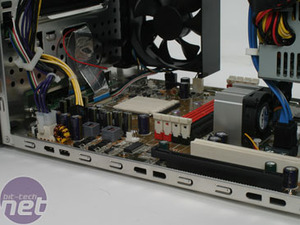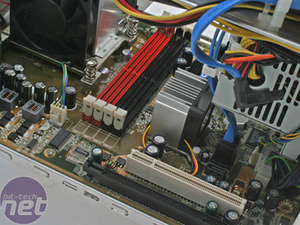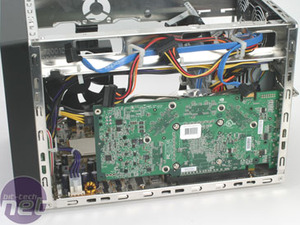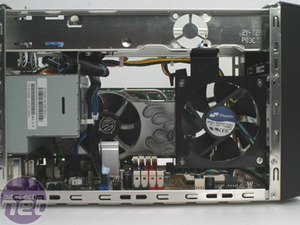The motherboard uses NVIDIA's recently-released nForce 570 Ultra MCP which is exactly the same as nForce 570 SLI, but obviously lacking SLI support. With room for only one PCI-Express x16 slot, it's unnecessary to use a more expensive chipset but you lose features like Link Boost and Dual PHY Gigabit Ethernet with Teaming and the other NVIDIA networking technologies, but those are possibly unnecessary in this SFF barebones.
Due to the way the P-series chassis was designed it means that it is still possible to use a video card with a dual slot cooling solution, like ATI's Radeon X1900/X1800 series or NVIDIA's GeForce 7900 GTX and GeForce 7950 GX2 cards. However, in doing so, you can't use the PCI slot next to it. On the topic of the PCI slot, Shuttle has opted for this rather than less useful PCI-Express x1 used in the SN25P.

 There are an impressive four DDR2 memory slots, meaning that there is support for up to 8GB of DDR2 - this is over and above of the usual pair of DIMM slots found in previous Shuttle XPCs. There are also three internal SATA ports for the three drive bays available for hard drives. This means that it is possible to run RAID 5 (as well as 0, 1, 0+1) if need be. Technically you can run a six disk RAID 5 array across the four SATA ports and two IDE connectors, but it would be far from optimal.
There are an impressive four DDR2 memory slots, meaning that there is support for up to 8GB of DDR2 - this is over and above of the usual pair of DIMM slots found in previous Shuttle XPCs. There are also three internal SATA ports for the three drive bays available for hard drives. This means that it is possible to run RAID 5 (as well as 0, 1, 0+1) if need be. Technically you can run a six disk RAID 5 array across the four SATA ports and two IDE connectors, but it would be far from optimal.

 The audio codec is the slightly older, but still capable Realtek ALC882. It still provides 8-channel audio and as previously shown, Shuttle integrates plenty of audio connector options on both the front and back of the chassis to suit everyone. The PCI slot means PCI soundcards like M-Audio or Creative can still be used as long as you don't install a dual-slot video card.
The audio codec is the slightly older, but still capable Realtek ALC882. It still provides 8-channel audio and as previously shown, Shuttle integrates plenty of audio connector options on both the front and back of the chassis to suit everyone. The PCI slot means PCI soundcards like M-Audio or Creative can still be used as long as you don't install a dual-slot video card.
The ALC882 codec is actually better than the ALC883 offering further support for 32-bit sound over just 16/20/24-bit. The ALC882 also has a better signal to noise ratio at 103dB DAC and 95dB ADC compared to 95dB and 85dB respectively on the ALC883. Unfortunately though, there is no Dolby support: that's only available with the ALC882M codec.
Due to the way the P-series chassis was designed it means that it is still possible to use a video card with a dual slot cooling solution, like ATI's Radeon X1900/X1800 series or NVIDIA's GeForce 7900 GTX and GeForce 7950 GX2 cards. However, in doing so, you can't use the PCI slot next to it. On the topic of the PCI slot, Shuttle has opted for this rather than less useful PCI-Express x1 used in the SN25P.




The ALC882 codec is actually better than the ALC883 offering further support for 32-bit sound over just 16/20/24-bit. The ALC882 also has a better signal to noise ratio at 103dB DAC and 95dB ADC compared to 95dB and 85dB respectively on the ALC883. Unfortunately though, there is no Dolby support: that's only available with the ALC882M codec.

MSI MPG Velox 100R Chassis Review
October 14 2021 | 15:04







Want to comment? Please log in.